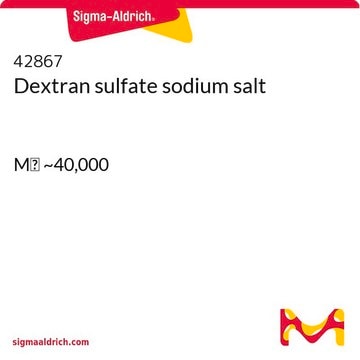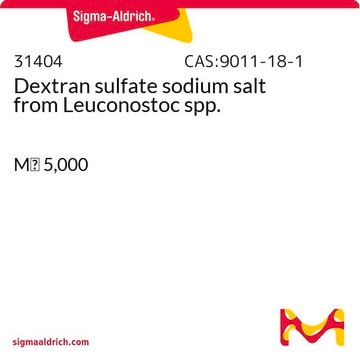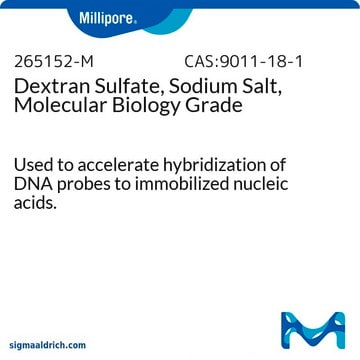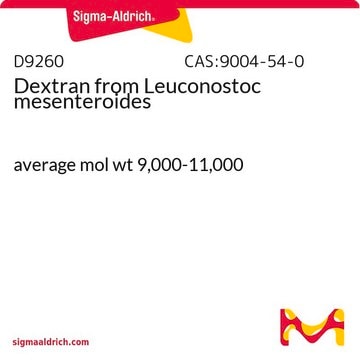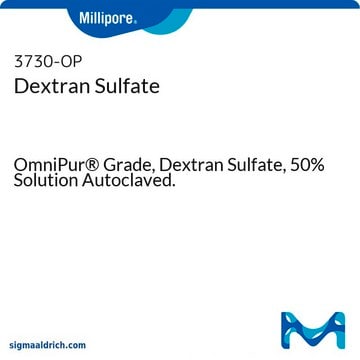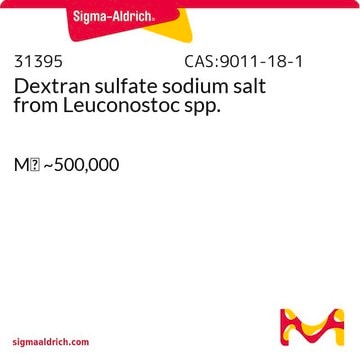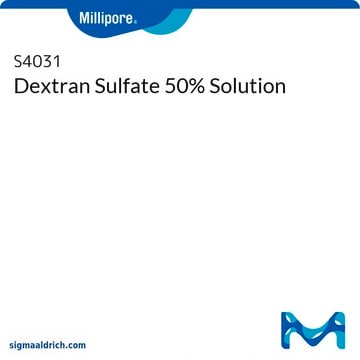D4911
Dextran sulfate sodium salt from Leuconostoc spp.
mol wt 6,500-10,000
Sign Into View Organizational & Contract Pricing
All Photos(3)
About This Item
Recommended Products
biological source
bacterial (Leuconostoc)
Quality Level
form
powder
mol wt
6,500-10,000
composition
Sulfur Content, 16.0-22.0%
color
white to light yellow
useful pH range
6.0-8 (10 g/L)
solubility
H2O: 100 mg/mL
storage temp.
room temp
Looking for similar products? Visit Product Comparison Guide
General description
Dextran sulfate is a sulfated polysaccharide, which is negatively charged. It is produced by the esterification of dextran with chlorosulphonic acid. Dextran is used to treat hemorrhage, burns, surgery and trauma. It improves blood flow and prevents erythrocyte aggregation. Dextran lowers the risk of thrombosis and postoperative pulmonary emboli. It is a ribonuclease inhibitor. Dextran sulfate exhibits antiviral, anticoagulant and adjuvant properties.
Application
Dextran sulfate sodium salt Leuconostoc spp has been used:
- as a standard to perform polyacrylamide-gel electrophoresis for carbohydrates (C-PAGE)(59) and agarose gel electrophoresis(60)
- for RNA sequential probing of targets (SPOTs) imaging(61)
- as a component of 1% injection buffer(62)
Other Notes
To gain a comprehensive understanding of our extensive range of Dextrans for your research, we encourage you to visit our Carbohydrates Category page.
Storage Class Code
11 - Combustible Solids
WGK
WGK 2
Flash Point(F)
Not applicable
Flash Point(C)
Not applicable
Personal Protective Equipment
dust mask type N95 (US), Eyeshields, Gloves
Choose from one of the most recent versions:
Certificates of Analysis (COA)
Lot/Batch Number
Don't see the Right Version?
If you require a particular version, you can look up a specific certificate by the Lot or Batch number.
Already Own This Product?
Find documentation for the products that you have recently purchased in the Document Library.
Customers Also Viewed
Valter R M Lombardi et al.
Journal of biomedicine & biotechnology, 2012, 826178-826178 (2012-05-24)
One of the main treatments currently used in humans to fight cancer is chemotherapy. A huge number of compounds with antitumor activity are present in nature, and many of their derivatives are produced by microorganisms. However, the search for new
The Molecular Biology of Poliovirus (2012)
The Molecular Biology of Poliovirus (2012)
Radiotherapy, Surgery, and Immunotherapy (2012)
Rheology of Industrial Polysaccharides: Theory and Applications (2012)
Our team of scientists has experience in all areas of research including Life Science, Material Science, Chemical Synthesis, Chromatography, Analytical and many others.
Contact Technical Service
